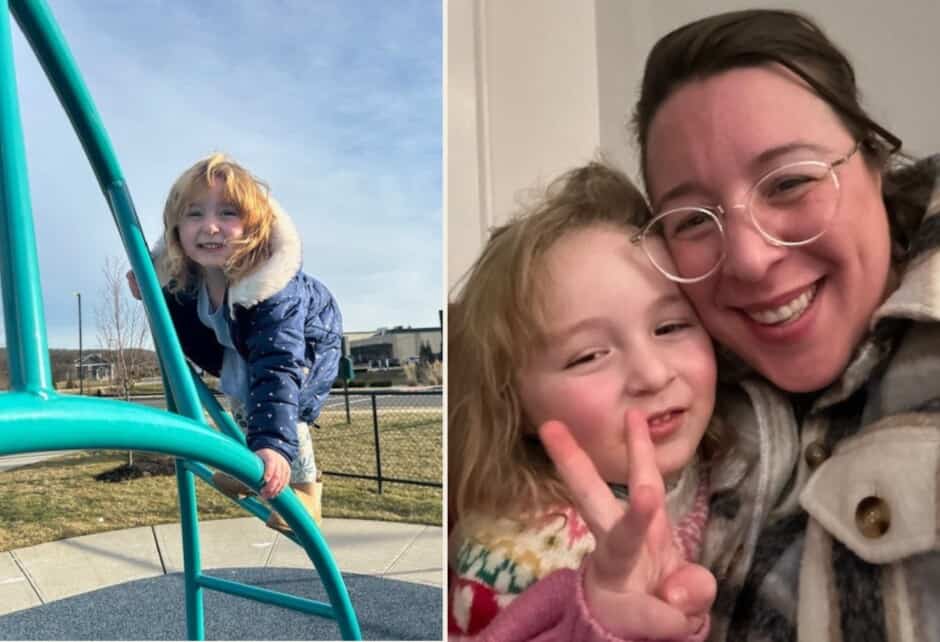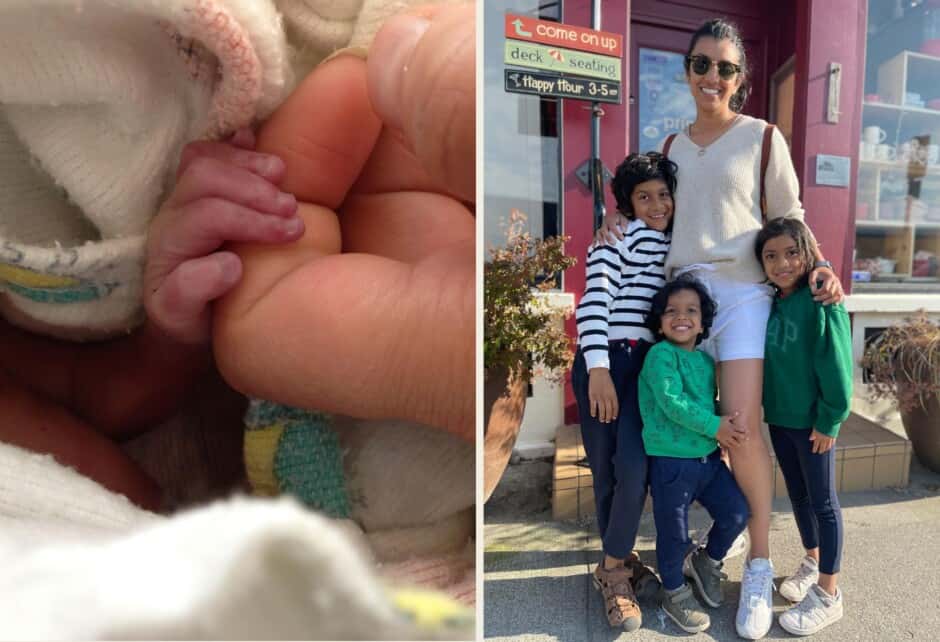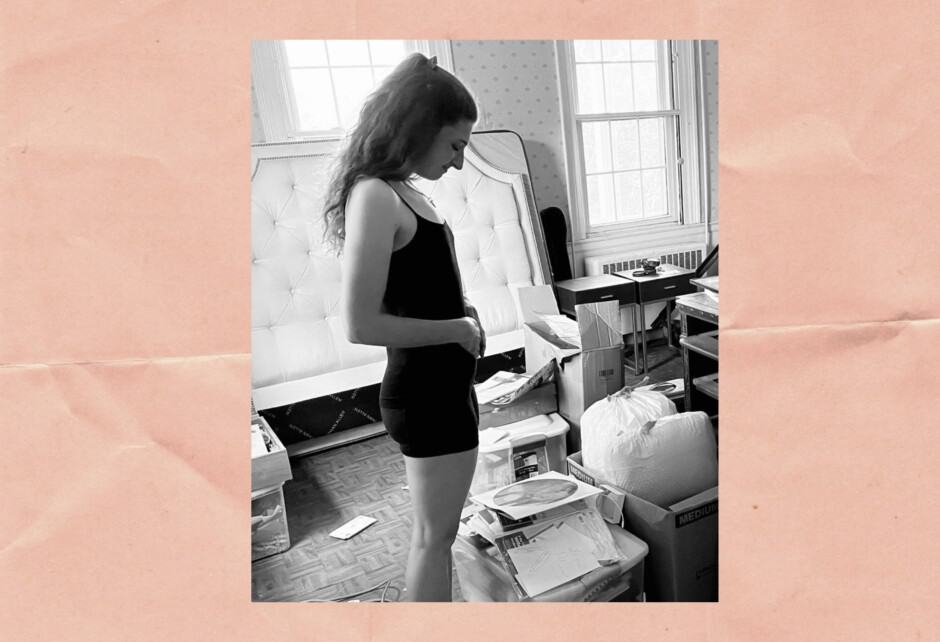
Mom Talk: When Postpartum Depression Doesn’t Go Away
Written by Naomi Segel
Photography by Image courtesy of Naomi Segel
Naomi Segel is a trained social worker with a background in psychology. She is highly educated, has a supportive family, and considers herself to have strong coping skills. And yet, after the birth of her daughter she was swallowed by debilitating postpartum depression that held her in its grip for years. In today’s Mom Talk, Naomi shares her difficult story, and uses her professional knowledge coupled with her personal experience to offer a roadmap for others. Naomi works for Boulder County Housing & Human Services as a parent educator, and is a mom to two young daughters: Ava (4) and Nora (1.5). Read on for her brutally honest story, and insights for how other parents suffering from PPD can heal.
“I never expected motherhood to be like this. I truly believed that once I saw her face I would be in love. The kind of love that was pure bliss, where nothing else would matter. No amount of crying or sleepless nights would matter because my love for my daughter would be so strong.”
“I miss my old life. I miss laughing and spontaneous adventures with my husband. Mainly, I miss my independence. Who have I become? How did it get this bad? This is supposed to be the best time in my life. This incredible and fulfilling time of life called motherhood. People are always telling me to enjoy every moment. Shouldn’t I just be grateful? Grateful I could get pregnant so easily (one miscarriage and then this baby). Shouldn’t I just be grateful to have a gorgeous and healthy daughter? Isn’t this enough?”
“I am miserable, and I have so much guilt. Sometimes I just want to run away from this life. I watch as my family and friends dote over her and it pains me. I felt like a horrible mother for not loving her the way everyone else does. I have to hide feelings from friends and coworkers. The well-meaning person asking, ‘Isn’t being a mother the most incredible thing?’ and ‘I bet you can’t even remember your life without a baby.’ Actually, I can. I had a fulfilling life, a happy marriage, full of many adventures. How was I so misled into thinking that motherhood would be this blissful place full of tummy kisses, snuggles, and laughter? And then there is the question, ‘So when will you have another baby?’ This usually causes me to tense up and almost have a panic attack.”
“My husband and I took a birth preparation class, newborn class, and got all the baby supplies we needed. We assumed that we were well educated and prepared. But I never expected this. I never thought this would happen to me. I am a Master’s level social worker. I have excellent coping skills, an incredibly helpful and loving husband, and a supportive family. And yes, this happened to me.”
I wrote these words right around the time my daughter was four months old and I had recently returned to working full-time. I was confused as to why I still did not feel love for my baby. Furthermore, these feelings persisted as she grew through toddlerhood.
Postpartum depression (PPD) is defined as depression suffered by a mother following childbirth, typically arising from the combination of hormonal changes, psychological adjustment to motherhood, and fatigue. According to the Mayo Clinic, it can occur anytime within the first 12 months after giving birth and 15%-20% of moms develop postpartum depression (PPD), anxiety, OCD, or other mental health conditions. For half of women diagnosed with PPD, this is their first episode of depression. Untreated, postpartum depression may last for many months or longer. Signs and symptoms of PPD vary and can range from mild to severe.
Common symptoms can include depressed mood or severe mood swings, intense irritability and anger, excessive crying, fear that you are not a good mother, and difficulty bonding with your baby, which are symptoms that defined my experience. Furthermore, a mother might withdraw from family and friends, experience loss of appetite or eat more than usual, have trouble sleeping or sleep too much, have overwhelming fatigue or loss of energy, reduced interest and pleasure in activities she used to enjoy, feelings of hopelessness and worthlessness, shame, guilt, or inadequacy, diminished ability to think clearly, concentrate, or make decisions, restlessness, severe anxiety and panic attacks, thoughts of harming herself or her baby, and recurrent thoughts of death or suicide. A mom does not need to have every one of these symptoms to be depressed.
The cause of PPD is unknown. It is thought that sharp post-birth drops in estrogen, progesterone, and thyroid hormones contribute to it. Other causes may be stress, sleep deprivation, and nutrition deficits. It is estimated that about forty percent of PPD cases go undiagnosed, and these women do not get appropriate help. Most reports do not include PPD that occurs after stillbirths or miscarriages. PPD is more common than is currently recognized, and many mothers suffer silently. The exact amount of time it takes to recover from PPD is also not known, because it is necessarily different for every mother (which is true for all depression).
Many mothers are diagnosed within the first year after giving birth, while other moms do not realize that they had PPD until much later. Is it possible for a mother to have beautiful precocious 3-year-old, still not feel emotionally connected, and be experiencing troubling symptoms? Is it possible for a mom to actively avoid her child, to prefer to leave her child for extended periods of time with a relative, or to have little patience and be less affectionate with the child? Absolutely. There may even be other children in the home, and she is confused as to why she is struggling to connect with this child, but has such a strong bond with, or preference for, her other children.
My first pregnancy resulted in a miscarriage. Less than two months after my miscarriage, I got pregnant again. I never received therapy or other support to grieve my lost baby. After the necessary D&C procedure, I simply went home and quietly grieved and tried to move on with my life. During my second pregnancy, I did not connect emotionally with my daughter in utero, and chose to remain detached, for fear of losing another baby. At the time, I had no idea how crucial it is for attachment to your child to begin in the womb.
When a mother experiences trauma, she releases cortisol which the baby absorbs through the placenta. This can impact the development of the baby’s central nervous system. Emma Robertson Blackmore, PhD, a psychologist at the University of Florida, found that women who’d had a miscarriage or stillbirth were at higher risk of depression and anxiety during a subsequent pregnancy, and for up to three years after the birth of a healthy child. Robertson Blackmore states that pregnancy loss should be considered a risk factor for depression, during pregnancy and in the postpartum period, just like a family history of depression and other stressful life events.
During my daughter’s first year, I noticed that I had no emotional connection with her, and that I simply felt nothing. I avoided my daughter and preferred doing laundry, cooking, and housework. When there were guests in our home, I immediately handed them my baby. I had severe anxiety and sleep issues. Even when my daughter was sleeping I could not sleep. I started to panic when it was getting close to nighttime. I had a short temper, was often impatient, and was easily frustrated. I would regularly snap at my husband. I avoided people at work, and preferred to stay in the safe cocoon of my office. I honestly did not like my daughter.
I went through the motions of breastfeeding, changing diapers, and calming a crying baby. However, I could not enjoy the present moment. I kept waiting for it to “get better” or “get easier.” But it never did. The first therapist I met with (who specialized in postpartum wellness) made me feel even worse. She said, “Of course you love your daughter, don’t you?” These words felt like a punch to the gut. Because at the time, I did not feel love for my daughter.
When my daughter was two years old, I was still struggling to connect. I was aware that my attempts at connection did not feel natural, and that I had to really put effort into spending time with my child. My anxiety came crashing down on me when I knew I would be alone with her all day, or when my husband would be traveling for work. I had so much guilt and confusion. I was filled with conflicting emotions. I longed to feel nurturing and connected to my daughter; I was missing out on precious time. My soul was aching for maternal connection, and for finding peace with what had happened, to fix what had gone wrong.
In the Harvard Review of Psychiatry, researchers compared the findings of studies on postpartum depression published between 1985 and 2012. They found that symptoms of postpartum depression in most women recede over time, but for a large number of women, depression remains a long-term problem. Chronic symptoms were found in 38% of women. In women who were receiving medical care, it was noted that 50% of patients experienced depression for more than one year after childbirth. Thirty percent of women with PPD who were not receiving clinical treatment were still depressed up to three years after giving birth. This was an “ah-ha” moment for me. It made me realize that I was not alone, or crazy, in that my symptoms did not disappear after one year.
Healthy attachment develops when a mom (or other caregiver) responds to a baby’s cues in a reliable and dependable way. The relationship is built over time on shared experiences of trust, and connection also known as “serve and return.” The baby serves up a cue (i.e. crying) and the mother responds (i.e. picking up the baby). Researchers found that differences in attachment are not genetically determined but are rooted in interactions with the social environment during the first few years of life. Sensitive or insensitive parenting plays a key role in the development of secure or insecure attachments. Many moms develop a strong attachment with their baby the moment the baby is conceived, while for others it takes longer. Some studies have shown that prenatal attachment is an important factor in predicting postpartum attachment behaviors.
As devastating as its effects can be for new moms, PPD can also contribute to a range of negative outcomes for children as well. These include delays in cognitive and language development, disorganized or insecure attachment, higher rates of behavioral problems, and lower grades at school. Moreover, it can contribute to higher rates of depression in children during the latter teen years.
How moms heal from PPD can look different for each person. Current treatment methods include psychotherapy, antidepressants, Zulresso (new rapidly acting drug for PPD), natural progesterone, exercise, support groups, relationship with nature, meditation and spirituality, and improving diet and nutrition.
Personally, what ultimately helped me heal was a long list of changes, both big and small: Making sleep a priority and having a strict bedtime routine; Limiting social media use and reading fewer mom blogs; Not comparing myself to other moms; Self-care (for myself and my husband); Spending time away from my children; Using daycare (or family) as support; Saying no and setting boundaries; Spending one-on-one time with each child; Forgiving myself; Practicing gratitude and looking for joyful moments every day; Using affirmations and mantras to change negative feelings into positive thoughts; Therapy (individual and couples); Play therapy for my daughter to learn self-regulation and help address challenging behaviors; Writing and taking time alone to process; Changing up my life in major and minor ways—from moving to a new house and starting a new job to driving a different way to work or looking up at the sky (instead of looking down); Creating a vision board in order to help me realize what is truly important; Knowing that my relationship with each child is different, and that is okay; Looking at my struggles as opportunities to grow.
What would have helped to prevent my PPD or have helped me heal sooner? I was screened for PPD during well-baby visits with my daughter’s pediatrician and postpartum appointments with my midwife/OBGYN provider and I clearly showed symptoms. However, there was no follow-up offered by these professionals, and the help I did receive on my own was inadequate. It would have been helpful to be more educated about PPD ahead of time, to have the right therapist, or to participate in a home visiting program (i.e. Parents as Teachers, HIPPY, Nurse-Family Partnership) and have more support during prenatal and postnatal appointments.
I wish I was told early on that attachment with my daughter would not be damaged if I did not bond right away. It took time to realize that it is more important to spend quality time with her, not just quantity. In time, I learned that it was okay to have another caregiver step in when I could not meet her needs. I’d like to have known that, while the reality of mothering was far different than my hopes and expectations, this too, could be part of developing a healthy attachment with my child. Most importantly, I needed to realize that relationships really can be repaired and strengthened with time and determination.
The big takeaway: Never make assumptions! Never assume that a mom is thrilled to be pregnant or that having a baby is the highlight of her life. Ask the mom how she is really doing and be prepared to listen. Professionals should prepare to offer appropriate resources. It takes time to heal from PPD, and I strongly believe that we need a more educated and holistic way to treat it. This condition does not just arrive one day and disappear the next. With time, support, and access to the right resources, it is possible to repair and strengthen the mother-child bond, and for the mother to recover from this devastating form of depression.
Are you a mother with something to say? Send us an email to be considered for our “Mom Talk” column.
Leave a Reply to TC Cancel reply
Share this story




Was also screened for PPD at appointments post delivery and though I was trying to tell my OBGYN through tears that I wasn’t depressed, just tired, they pushed for me to start taking antidepressants. I wonder if the author tried antidepressants or made the choice not to. The medication literally gave me back my life and allowed me to start enjoying motherhood and my son. I really believe medication can save a mother’s life.
This is so important, thanks for sharing your story. For those that have experienced some or all of what you have, it’s hard to figure out why this happens. Most importantly, it’s powerful to read that it happens to others too.